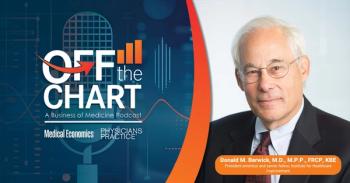
The Problem with Pay-for-performance Incentives for Physicians
Pay-for-performance is an increasingly popular, yet largely unproven, concept for rewarding the providers of healthcare. They can be helpful …or harmful.
I recently saw a 90-year-old patient at my cardiology practice. She was demented, but cooperative with the exam. A devoted daughter, with whom she lives, accompanied her to the appointment. Her dementia was severe enough to make a cogent history from the patient impossible. However, the daughter had something on her mind, and it had nothing to do with her mother’s heart condition.
“My mother’s primary-care doctor wants her to have a mammogram and colonoscopy. I don’t feel good about this. What’s your opinion?” she asked
“Is she having a problem with her bowels or her breasts?” I responded.
“No,” she replied. “[The doctor] just says it needs to be done.”
At this point in such a discussion I usually remain neutral, not wanting to second-guess the recommendation of a colleague. However, this seemed so blatantly ridiculous that I could not hold my tongue.
“Well,” I started, “If it were my mother, I would not consent to those tests.”
The daughter seemed satisfied with that answer, confirming her intuition and already made decision.
After the appointment, I looked at the name of the patient’s primary-care doc and insurance. I knew the doctor well, but saw few of her patients, as she belonged to a Medicare replacement HMO that referred rarely to our group. Having known this HMO for years, I was not particularly fond of its track record for providing high quality care. I was even more surprised when days later I read one of their ads in a local newspaper, during the yearly enrollment period for new Medicare Advantage subscribers, and they were bragging they had received a 4.5 (out of 5) star rating from Medicare. Hmmm.
Immediately, I knew that this must have something to do with money. As it turns out, that suspicion was correct. Medicare has started rating its Medicare Advantage plans with one star to five stars, awarded based upon various factors, such as “improving or maintaining health.” Preventive measures like flu shots, mammograms, and screening colonoscopies are included. What apparently isn’t included in the target measures of quality are any age limit. There is absolutely no evidence that these tests improve, or extend, the life of a nonagenarian. Indeed, doing these tests in this setting is not only a waste of money, but potentially dangerous.
The more stars the HMO gets, the more money they get from Medicare. In fact, this system was part of the Affordable Care Act. The health plan can garner millions of extra dollars and reward their docs as well. Bingo. Now I understand.
To be clear, I have nothing against preventive medicine. However, this is a classic example of how government mandated rewards for following boilerplate guidelines misses the mark and leads to unintended consequences. Pay-for-performance is an increasingly popular, yet largely unproven, concept for rewarding the providers of healthcare. Also known as "P4P," this payment model rewards physicians, hospitals, medical groups, and other healthcare providers for meeting certain performance measures for quality and efficiency. Depending upon how they are used, practice guidelines can be helpful or harmful. Based upon their track records, forgive my skepticism when they are placed in the hands of bureaucrats, masters of public health, and politicians.
Writing in his blog for the
“We examined the effects in 260 hospitals of a pay-for-performance demonstration project carried out by the Centers for Medicare and Medicaid Services in partnership with Premier Inc., a nationwide hospital system. We compared these results to those of a control group of 780 hospitals not in the demonstration project. The performance of the hospitals in the project initially improved more than the performance of the control group: More than half of the pay-for-performance hospitals achieved high performance scores, compared to fewer than a third of the control hospitals. However, after five years, the two groups’ scores were virtually identical."
For better or worse, with the Affordable Care Act now the law of the land, I suspect we will see more of these types of good intentioned guidelines resulting in little improvement in the overall health of the elderly.
Newsletter
Optimize your practice with the Physicians Practice newsletter, offering management pearls, leadership tips, and business strategies tailored for practice administrators and physicians of any specialty.






